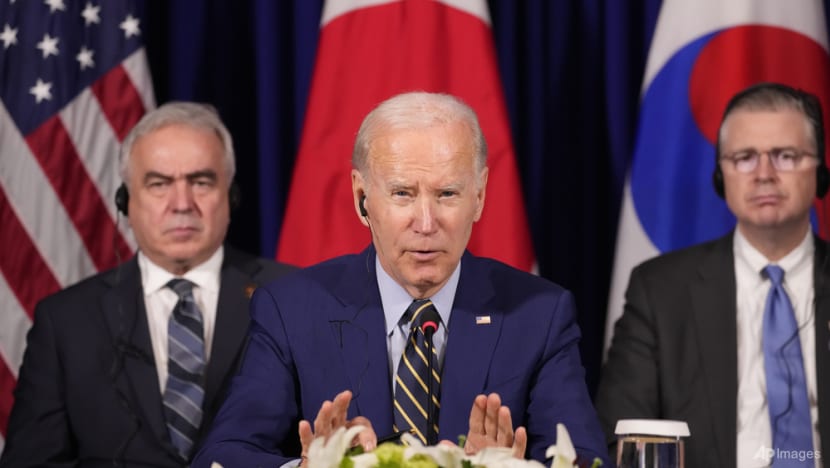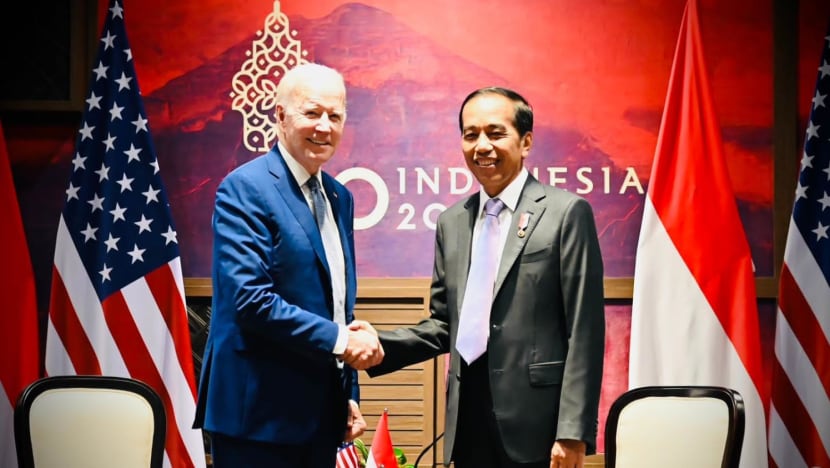Analysis: Biden’s no-show at ASEAN summit could cast doubts on US commitment to region
US Vice-President Kamala Harris will attend the ASEAN summit and other leaders' meetings in Jakarta while President Joe Biden goes to India for the G20 summit.

File picture of US President Joe Biden during the Association of Southeast Asian Nations (ASEAN) summit in Phnom Penh, Cambodia on Nov. 13, 2022. (AP Photo/Alex Brandon)
JAKARTA: United States President Joe Biden’s absence at the upcoming Association of Southeast Asian Nations (ASEAN) summit and other leaders’ summits in Jakarta will be a big loss for the grouping and for current chair Indonesia amid simmering geopolitical tensions, say analysts.
They add that his no-show will call into question Washington’s commitment to the 10-member grouping, which could in turn lead some ASEAN states to lean closer to Beijing, and allow China to deepen its influence in the region.
“It could mean that Mr Biden does not see any added value in attending the ASEAN summit, as in, maybe all the deals with ASEAN can no longer be improved through a physical meeting in Jakarta,” says Associate Professor Dinna Prapto Raharja, executive director of think tank Synergy Policies.
After days of speculation that Mr Biden would skip the ASEAN Summit, the White House finally confirmed the news on Tuesday (Aug 22), saying the president is scheduled to attend the Group of 20 (G20) Leaders’ Summit in India from Sep 7 to 10 while Vice-President Kamala Harris will travel to Jakarta from Sep 4 to 7.
The 43rd ASEAN summit will be on Sep 5 to 7, during which there will also be other summits such as the ASEAN-China summit, the ASEAN-US summit and the East Asia summit.
According to White House Press Secretary Karine Jean-Pierre, Mdm Harris will reaffirm the US’ commitment to Southeast Asia and ASEAN centrality, and “advance initiatives to promote our shared prosperity and security”, including efforts to uphold and strengthen international rules and norms in the region, and other regional and global challenges.
However, Associate Professor Teuku Rezasyah from Bandung’s Padjadjaran University believes that Mdm Harris representing Mr Biden is simply not the same.
“A president is a president, isn’t it? There are many presidents in US history, and we always remember the presidents. Not the vice-presidents,” adds Assoc Prof Rezasyah.
ALLOWING CHINA TO TAKE THE LEAD
Mr Biden's absence in Jakarta could complicate matters for the ASEAN grouping that is trying to stay united and neutral amid Sino-US tensions that have deepened in recent years over trade issues among others, says Associate Professor Dinna Prapto Raharja, an expert on diplomacy.
“It could also mean that the US does not see ASEAN as a forum that has added value for the US pivot strategy in the Indo-Pacific region. Don't forget that the US already has AUKUS, which is more pragmatic and has clear timelines and targets,” she adds.
Formed in Sep 2021, AUKUS is a military alliance between the US, UK, and Australia directly responding to China’s efforts to expand its nuclear capabilities.
It allows the US and UK to assist Australia in obtaining nuclear-powered submarines, a move which neighbouring Indonesia is not thrilled about.
Assoc Prof Rezasyah believes Mr Biden’s absence has a big impact on ASEAN which he believes is divided as some countries are leaning towards China.
“The absence of Mr Biden means acknowledging that China has a bigger influence in ASEAN as it now has more agreements with the group compared to the US. His no-show indicates a lack of effort to repair the situation,” he adds.
“Now, if Mr Biden does not come, the US is permitting ASEAN to be on its own and also to permit China to take the lead because if Biden is here, he could prevent China from producing unnecessary initiatives.”
STRENGTHENING OTHER PARTNERSHIPS
Mr Biden will not be the first US president to miss the ASEAN summit and related meetings involving leaders from the region and the grouping’s partner-countries.
His predecessor Donald Trump did not attend the ASEAN summits three years in a row from 2018 to 2020, which observers believe resulted in outcomes detrimental to Asean’s centrality and interests.
“When Trump was not present (at the summits), the follow-up was that the US turned to AUKUS. It was created without consultation with ASEAN or Indonesia, even though Australia and the US are dialogue partners close to Indonesia,” says Assoc Prof Raharja.
“So it should be anticipated that in the future there will be new surprises from the US and even its regional political opponents which no longer take into account the significance of ASEAN as a regional organisation.”
She adds that the Asean grouping must pay special attention to the US and its allies if they want the next summits to remain relevant.
Prof Evi Fitriani, an international lecturer from the University of Indonesia calls it “a big loss and disappointment” as the attendance of a US president would have made the summit more “high-profile”.
But she also says Indonesia and ASEAN should not make a big fuss out of the situation, adding that his no-show would not make much difference in terms of the summit outcome.
“Would ASEAN automatically fall into the hands of China now? No, because there are still other big powers, such as Japan, the European Union, India, and Russia,” she adds.
Also, Prof Fitriani believes that even if Biden were to attend the summit, there is no guarantee that it would lead to outcomes that would benefit ASEAN.
Citing the Indo-Pacific Economic Framework for Prosperity (IPEF), an economic initiative launched last year by the US which includes 14 countries in the Indo-Pacific, the professor says it only benefits Washington in its effort to contain Beijing.
“It does not significantly affect development in ASEAN countries…it does not give market access to ASEAN countries, no additional support for development,” she highlights, adding how it only involves seven ASEAN members while excluding Cambodia, Laos and Myanmar, which are viewed as China-friendly states.
In view of the Biden no-show, Prof Fitriani suggests that ASEAN should expand its partnerships with other countries to avoid being trapped with just China.
“Therefore, it is very important for ASEAN to expand their partnerships with other countries such as the European Union, Russia, Japan and India,” she adds. “So that we have other dialogue partners apart from the US and China.”

IMPACT ON INDONESIA'S CREDIBILITY
While Mr Biden’s no-show could affect ASEAN, it would disappoint Indonesia the most, say analysts.
The decision to skip the summit will have a detrimental impact on Indonesia as the current chairman of ASEAN, Assoc Prof Raharja says.
It shows the US views ASEAN as not so important, she says, adding that it is unfortunate to happen during Indonesia’s chairmanship, the biggest economy in ASEAN, which is often touted as the big brother of the bloc.
Assoc Prof Rezasyah shares similar views. “This would have been the jewel in the crown of Indonesian diplomacy under Mr Jokowi,” he says, referring to the Indonesian president by his nickname.
Next year, the rotating chairman of ASEAN will be Laos, viewed as a close ally of China.
Indonesian President Joko Widodo will hand over the chairmanship to Laos at the end of the summit on Sep 7.
This year’s ASEAN chairmanship is Indonesia’s last gig in the international arena under Jokowi, who had chaired the G20 last year, where Mr Biden met with his Chinese counterpart Xi Jinping for the first time since the US president took office.
Indonesia will head to the polls next year, and by October, a new president will be sworn in as the constitution only allows a person to be in office for two terms maximum, which Jokowi would have reached by then.
“This (Mr Biden’s no-show) will affect Jokowi’s credibility because to receive the US’ attention means to receive the world's attention,” says Assoc Prof Rezasyah.
However, he believes Mr Biden’s no-show may stem from doubts over the US-Indonesia relationship given that Jakarta has posted three (Indonesian) ambassadors to Washington within four years' time.
He notes that the frequent change shows how Indonesia lacks preparation and selection capacities and underscores its lack of attention to the US global credibility.
“It means that the Indonesian ambassadors have not learnt enough from the US, didn’t utilise their potential, and didn’t manage to liaise with their US counterparts such as the legislative, the executive, and the judicative branches of the American political system,” adds Assoc Prof Rezasyah.
Read this story in Bahasa Indonesia here.

















